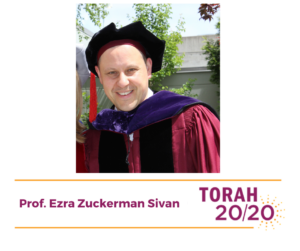A D’var Torah for Parshat Matot-Masei by Professor Ezra Zuckerman Sivan
The book of Numbers concludes with an apparent setback for the Daughters of Zelophehad (Numbers 27:1-11), the five sisters who courageously demand that their late father’s right to tribal land be recognized even though he had no male heirs.
“Truly the daughters of Zelophehad speak,” God had responded. The apparent lesson was that God’s Torah may be adapted to meet human needs and that women may lead in articulating such needs. But now Moses says, “Truly the staff of Joseph speaks” as he accepts a petition to prevent the sisters from marrying outside their patriarchal clan. That way, tribal lands “will not circulate” as they would if the daughters married outside their tribes. And so the daughters marry their first cousins.
How is this apparent reversal of the daughters’ achievement a fitting conclusion to Numbers?
Perhaps the answer lies in the possibility that there is more to their achievement than it seems. And perhaps they obtained what they sought after all.
How so?
A midrashic tradition (Tosafot on Bava Batra 19b) hints at this greater achievement when it suggests that Zelophehad was the wood gatherer (Numbers 15:32-36) whom God ordered be stoned to death for gathering wood on the Sabbath.
Sign up to receive Torah 20/20 in your inbox each week.
This midrash is hinting at a deep link between stories that seem incompatible — one in which God seems inspiringly empathetic and one in which He seems shockingly cruel.
To appreciate that link, consider the following: Can you imagine a situation (on any day of the week) where you would get very angry at someone just because they were doing something as mundane as gathering wood?
Before you answer too quickly, reflect on our experience during the COVID-19 pandemic. It turns out that we can all think of many situations like this. If it’s not wood-gathering, it might be hoarding toilet paper or PPE or hand sanitizer.
This situation is what’s known as the “tragedy of the commons.” If a public resource is essential for life (as wood is in the wilderness), might we not be very zealous in trying to secure it for our family? And what would we say about someone who violated a “lockdown” to grab such resources? This is a threat both to social order and to that lockdown, i.e., the Shabbat (which was then a fledgling social institution)! The stakes are in fact so high, we should not be surprised that the most severe punishment of the day was applied.
If the wood gatherer teaches us about the threat of a raid on the commons, the sisters reinforce the lesson by anticipating a more subtle version of it. Consider what would have happened had the daughters not acted. In short, Zelophehad’s brothers likely would have fought over who should get their brother’s land. At the extreme, if all it takes to inherit land is to be the last brother standing, we face the dire prospect of a fratricidal free-for-all.
Find more commentaries on Parshat Matot-Masei.
After all, the context for the second half of Numbers is war (for the Transjordan and with Canaan looming). And not only do wars raise tensions about the sharing of burden (Numbers 32:1-32) and of spoils (Numbers 31; Joshua 7), wars have long been used as covers to settle internal scores (I Samuel 18:17; II Samuel 11:15).
The sisters thus make a bold strike to soften such pernicious competition.
And they obtain even more.
Consider more context: women typically appear in stories of ancient wars as objects of male competition.
This context is important for appreciating the progressiveness of Deuteronomy’s (21:10-14) decree that captured women be treated as human beings who are emotionally attached to their parents, whose beauty is superficial, and who cannot be sold into slavery.
And here in the conclusion to Numbers, Moses decrees not only that the sisters must marry within their tribe but that they get to choose “whomever is good in their eyes.” That is, they decide based on their preference. This transforms the competition from one in which men fight with each other to obtain women as prizes to one in which men struggle to understand what the women want.
The marriages of the cousins is thus a fitting capstone to Numbers’ grappling with pernicious social competition, and it is an especially appropriate ending to a remarkable story of bold collective female agency to overcome natural sisterly rivalry. Mahlah, No’ah, Hoglah, Milkah, and Tirtzah demanded to be recognized. God heard them, and now their life partners would, too.
Ezra Zuckerman Sivan, an economic sociologist, is the Alvin J. Siteman Professor of Entrepreneurship and Strategy at the MIT Sloan School of Management, where he is associate dean for teaching and learning. In addition to his academic publishing, Ezra writes literary essays on Tanach (published at thelehrhaus.com and on blogs.timesofisrael.com) focused on sociological themes, and he is writing a book on the emergence of the seven-day week from social scientific and biblical perspectives. His Torah 20/20 d’var Torah for Matot-Masei is drawn from an essay entitled “How to Curtail Pernicious Social Competition: The Legacy of Zelophehad and his Daughters.”

